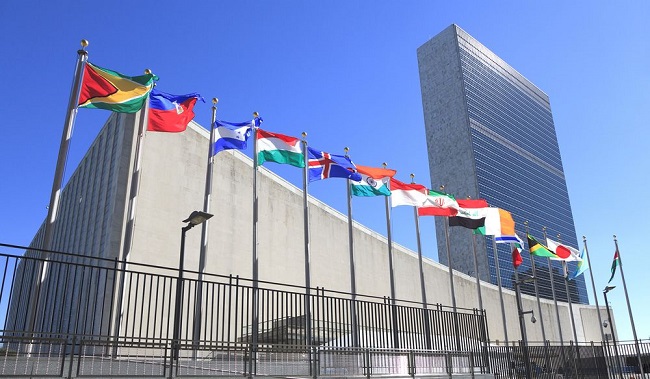African leaders are advocating for a new approach to measuring the continent’s green wealth, emphasising that current gross domestic product measures in most African countries are outdated and underestimate their true wealth.

They spoke on Thursday, April 24, 2025, at an event hosted by the African Union Commission and the African Development Bank Group at the African Union Mission to the United States on the sidelines of the 2025 Spring Meetings of the World Bank Group and the International Monetary Fund (IMF).
“We need to talk the talk and walk the talk. It is time to turn our commitments and pledges into concrete actions,” said Ambassador Hilda Suda-Mafudze, Permanent Representative of the African Union Mission to the U.S.
“We need to invest in our systems of national accounts. If we want to have accurate measures of our wealth and create a store of assets, we can leverage them to drive our ambitions of shared prosperity and sustainable development.”
The event featured discussion of a 2024 African Development Bank Group report that found that including the value of carbon sequestered in African forests only would have resulted in an additional $66.1 billion of GDP for the continent in 2022, an expansion of about 2.2 percent.
Professor Kevin Urama, African Development Bank Chief Economist and Vice President presented key findings from the report, Measuring the Green Wealth of Nations: Natural Capital and Economic Productivity in Africa.
Leaders emphasised that a proper valuation of Africa’s natural resources would transform the continent’s financial landscape by unlocking access to global financial flows, improving national risk profiles, and creating new capacity for investments in green economies and climate-resilient infrastructure.
This call to action comes ahead of the November UN Climate Change Conference in Belém, Brazil, where African leaders are expected to press for reforms to the global economic and financial infrastructure, so these better reflect Africa’s green wealth and sustainability contributions.
“It is time for us to redefine our identity as Africa,” said Nigerien Prime Minister Ali Lamine Zeine in a panel discussion on practical steps towards implementing the 2025 System of National Accounts (SNAs) in Africa. “Africa is underestimated. We must work strategically to change this.”
Panelists noted that several African countries still use SNAs dating back to 1968. SNAs are an international standard system of concepts and methods for national accounts that have been adopted by most countries worldwide.
Madagascar’s Minister of Economy and Finance Rindra Rabarinirinarison called for more robust technology transfer and technical capacity building to enable African countries to build proper statistical systems for natural capital. She outlined that Madagascar has launched pilot projects to leverage and measure the value of its natural resources.
“Madagascar is a rich country but not rich,” she lamented, pointing to the country’s abundant natural resources.
Erich Strassner from IMF’s Statistics Department described the report as transformational and assured that the Fund was ready to work with the African Development Bank, the World Bank, and governments to implement its recommendations.
He emphasised the need to focus on priorities in each country, “so that together we can put together a plan to bring each country up to speed on the new system of national capital evaluation.”
Quoting African Development Bank figures, Ambassador Suda-Mafudze observed that if countries rebased their GDP based on carbon sequestration by forests alone, the impact would be substantial, with estimated GDP increases of 38.2% in Côte d’Ivoire, 36.7% in Benin, and 33.5% in Niger.
“We need to ensure a proper valuation of Africa’s green wealth. When we know the value of this significant asset base and incorporate its true value into our national accounts, we improve our economies’ risk profiles and enhance access to financial flows for financing our development,” the Ambassador said.
In his presentation, Vice President Urama pointed to the massive economic value of Africa’s natural resources – estimated at $6.2 trillion in 2018 – and the fact that the continent accounts for 26% of global forest-based carbon capture despite contributing only 4% of global carbon emissions.
“Africa’s green wealth and the important global public goods and ecosystem services it provides to the world are often overlooked in economic valuations,” Urama said. “This significantly underestimates African countries’ gross domestic product, despite abundant green wealth.”
He said that in addition to natural capital, ecosystem services and informal economic activities were also not factored into GDP.
Revaluing these assets through Natural Capital Accounting (NCA) and the updated System of National Accounts, which includes the informal sector, could significantly increase Africa’s GDP and improve access to sustainable finance, Urama noted.
“This is not just about correcting statistics. It’s about ensuring comparability of the measures of countries’ GDP in Africa and globally. By updating the System of National Accounts in countries, we can ensure that the basket of goods and services included in the measure of GDP of countries is the same, and avoid comparing oranges and apples,” Urama said.
He called on African countries to allocate appropriate budgets to upgrade their National Accounting Systems and rebase their GDPs, noting that “this is a smart investment that can deliver low-hanging fruit.”
The Executive Secretary of the African Economic Research Consortium, Prof. Victor Murinde, described the new model developed by the African Development Bank as transformative.
“It is a bold step to address a methodological gap in how the GDP of countries is measured to consider the true wealth of nations. Its recommendations provide rich materials for economists to work on in the coming years to improve the methodology for assessing the wealth of nations,” he remarked.
The African Development Bank expressed a commitment to work with the World Bank, the IMF, and other partners to implement the recommendations of the report. It is also advancing practical steps that include creating standard methods to value natural resources, connecting environmental goals with other policies, training local experts across Africa, and helping African countries sell their environmental benefits in worldwide carbon markets.
The Bank Group will also host the African Natural Capital Accounting Community of Practice.
